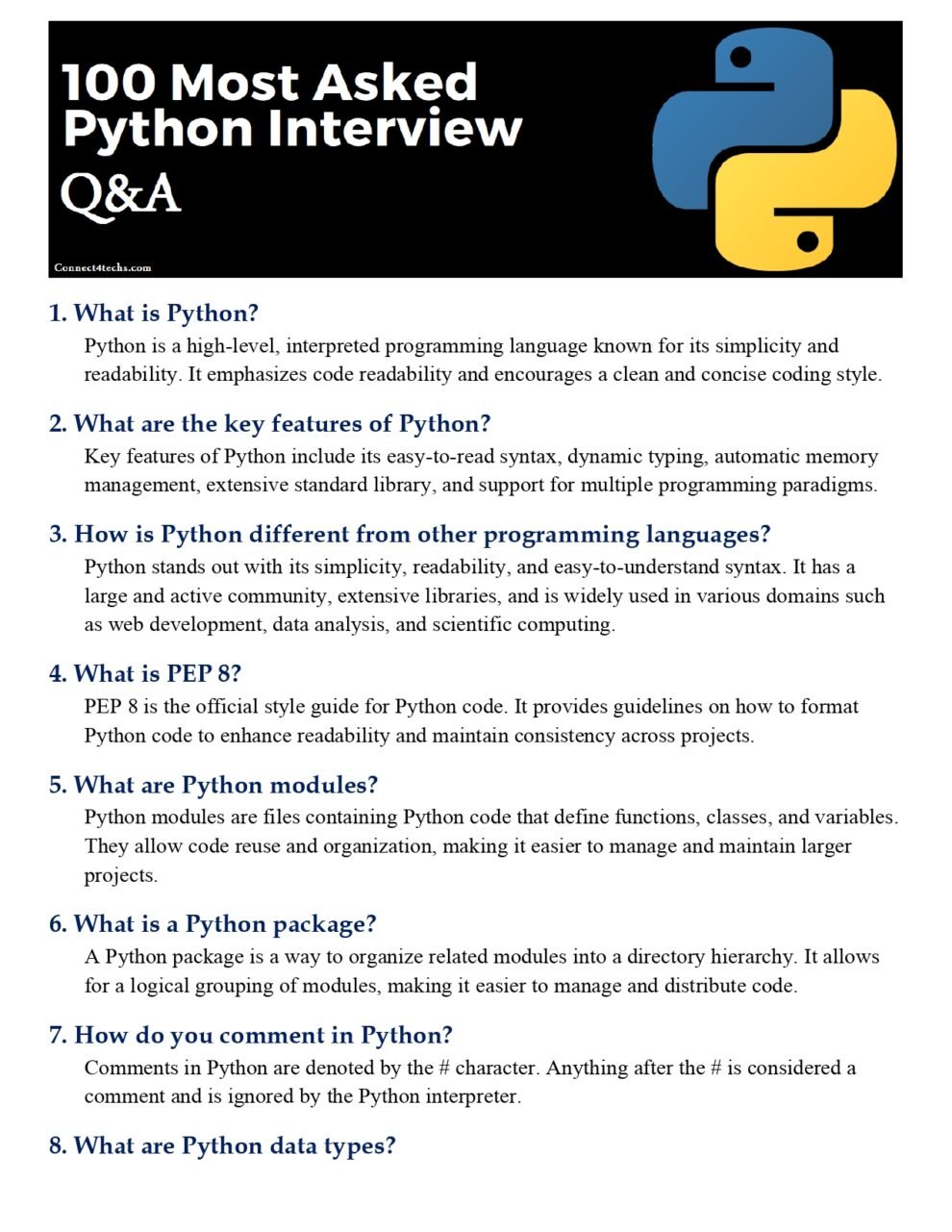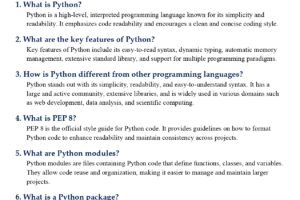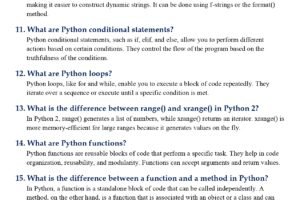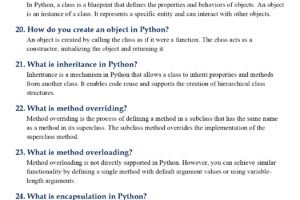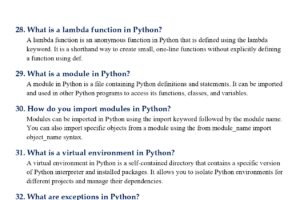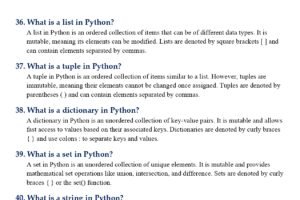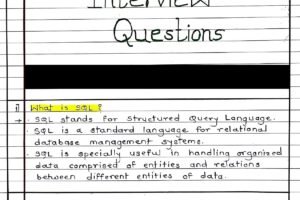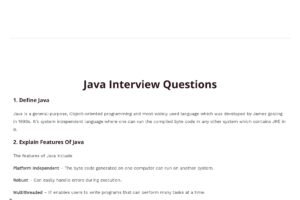Python Interview Questions and Answers
Python is a high-level programming language that has become popular in recent years. It is used in many industries, including data science, web development, and artificial intelligence. If you’re looking to land a job as a Python developer, you’ll need to be well-prepared for the interview process.
To help you prepare, we have compiled a list of the most commonly asked Python interview questions and answers. This PDF contains 100 Q&A that cover topics such as Python basics, data structures, object-oriented programming, modules, exceptions, and more.
Python Interview Questions PDF
By studying these questions and answers, you’ll be well-equipped to tackle any Python interview with confidence. So, let’s dive in and start preparing for your next Python interview!
The Contents
- What is Python?
- What are the key features of Python?
- How is Python different from other programming languages?
- What is PEP 8?
- What are Python modules?
- What is a Python package?
- How do you comment in Python?
- What are Python data types?
- What is type conversion in Python?
- What is string interpolation in Python?
- What are Python conditional statements?
- What are Python loops?
- What is the difference between range() and xrange() in Python 2?
- What are Python functions?
- What is the difference between a function and a method in Python?
- How do you define a function in Python?
- What is the __init__ method used for?
- What is object-oriented programming (OOP)?
- What are Python classes and objects?
- How do you create an object in Python?
- What is inheritance in Python?
- What is method overriding?
- What is method overloading?
- What is encapsulation in Python?
- What is polymorphism in Python?
- What is a generator in Python?
- What are decorators in Python?
- What is a lambda function in Python?
- What is a module in Python?
- How do you import modules in Python?
- What is a virtual environment in Python?
- What are exceptions in Python?
- What is error handling in Python?
- What is the purpose of the try-except-else-finally block in Python?
- What are the built-in data structures in Python?
- What is a list in Python?
- What is a tuple in Python?
- What is a dictionary in Python?
- What is a set in Python?
- What is a string in Python?
- How do you concatenate strings in Python?
- How do you format strings in Python?
- What are file handling operations in Python?
- How do you open and close a file in Python?
- What are the different file modes in Python?
- What is exception handling in file operations?
- What is a context manager in Python?
- What is a generator function in Python?
- What is a list comprehension in Python?
- What is the pass statement in Python?
- What is the purpose of the self parameter in Python?
- What is the difference between a shallow copy and a deep copy in Python?
- What are the advantages of using Python for web development?
- What is the Global Interpreter Lock (GIL) in Python?
- What is a metaclass in Python?
- How do you handle file I/O errors in Python?
- What is the purpose of the __name__ variable in Python?
- What is the difference between a shallow comparison and a deep comparison in Python?
- What are the advantages of using virtual environments in Python?
- What is the purpose of the __main__ block in Python?
- What is the purpose of the __str__ method in Python?
- What is the purpose of the __repr__ method in Python?
- What is the difference between the __str__ and __repr__ methods in Python?
- What is the purpose of the super() function in Python?
- What is the purpose of the __getitem__ method in Python?
- What is the purpose of the __setitem__ method in Python?
- What is the purpose of the __len__ method in Python?
- What is the purpose of the __iter__ method in Python?
- What is the purpose of the __next__ method in Python?
- What is the purpose of the @property decorator in Python?
- What is the purpose of the @staticmethod decorator in Python?
- What is the purpose of the @classmethod decorator in Python?
- What is the purpose of the __call__ method in Python?
- What is the purpose of the *args and **kwargs parameters in Python?
- What are decorators in Python?
- What is the purpose of the @classmethod decorator in Python?
- What is a lambda function in Python?
- What are modules in Python?
- What are packages in Python?
- What is the purpose of the __init__.py file in a package?
- What is the purpose of the sys module in Python?
- What is the purpose of the os module in Python?
- What is the purpose of the datetime module in Python?
- What are decorators in Python?
- What is the purpose of the @property decorator in Python?
- What is the purpose of the @staticmethod decorator in Python?
- What is the purpose of the @classmethod decorator in Python?
- What is a lambda function in Python?
- What are modules in Python?
- What are packages in Python?
- What is the purpose of the __init__.py file in a package?
- What is the purpose of the sys module in Python?
- What is the purpose of the os module in Python?
- What is the purpose of the datetime module in Python?
- What is the purpose of the random module in Python?
- What is the purpose of the json module in Python?
- What is the purpose of the pickle module in Python?
- What are generators in Python?
- What is the purpose of the yield keyword in Python?
- What is the purpose of the zip() function in Python?
Nu Of Pages
13 Pages
